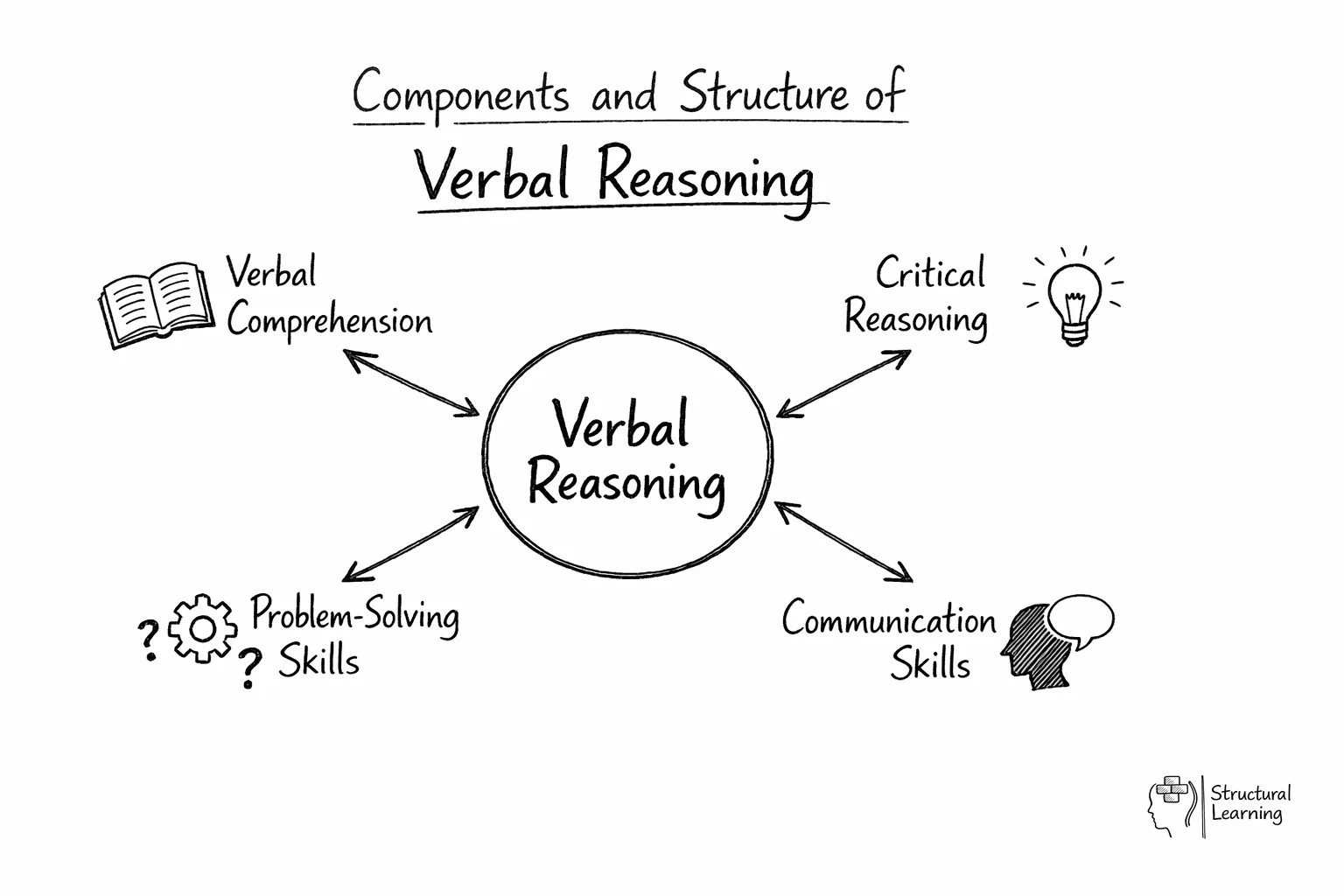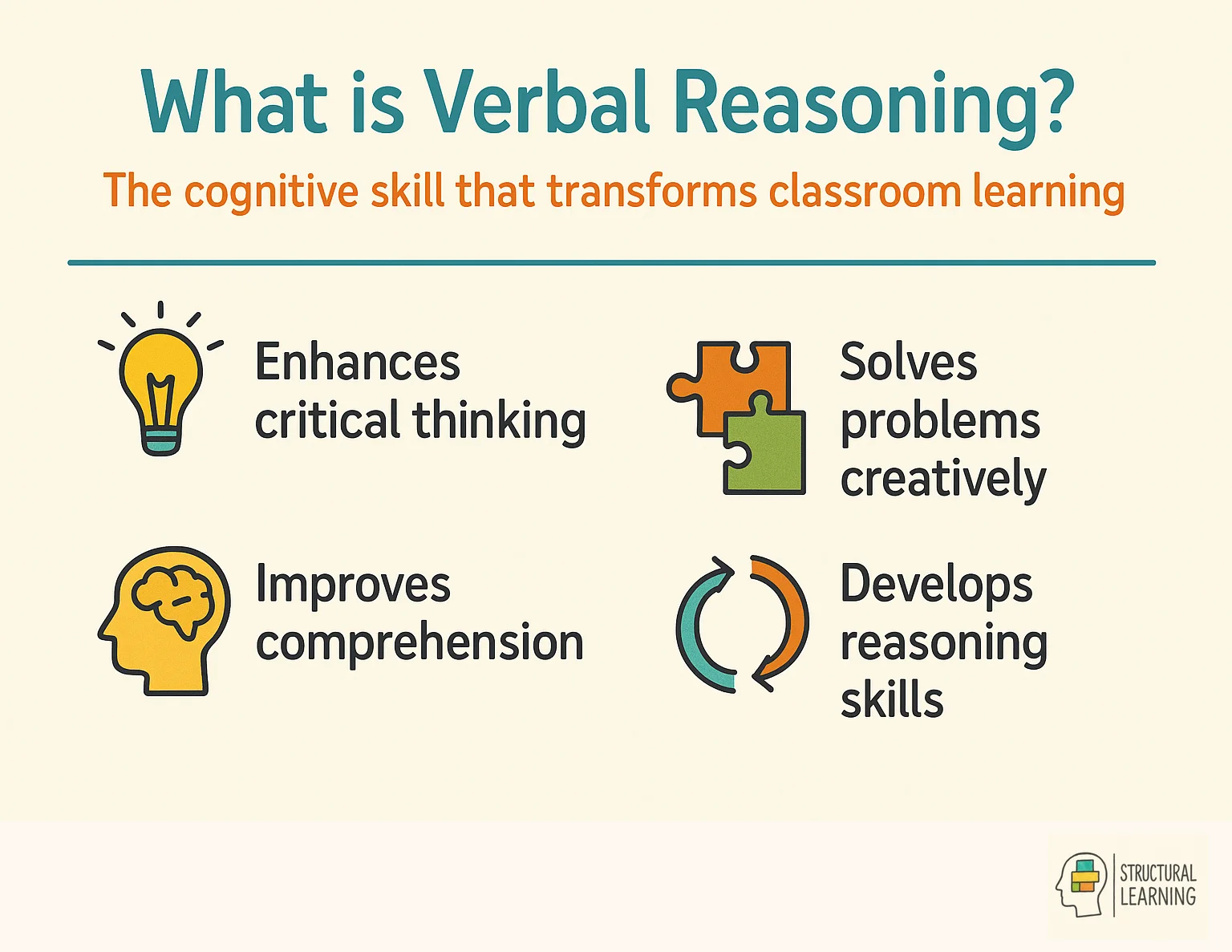Verbal Reasoning: A Classroom Catalyst for Higher-Order Thinking
Explore the importance of verbal reasoning in the classroom, how to measure it effectively, and strategies to facilitate meaningful discussions.


Explore the importance of verbal reasoning in the classroom, how to measure it effectively, and strategies to facilitate meaningful discussions.
Imagine a classroom where students engage in stimulating discussions, analyse complex texts, and approach problems with analytical precision. This active environment can be largely influenced by a powerful tool known as verbal reasoning. Verbal reasoning refers to the ability to understand, interpret, and reason using concepts framed in words, a skill that creates higher-order thinking.
Educational systems increasingly recognise the significance of verbal reasoning in shaping critical thinkers. Research shows that enhancing verbal reasoning abilities leads to improved performance in academics and standardised tests, ultimately preparing learners for future challenges. Furthermore, various types of verbal reasoning tests, such as verbal comprehension and critical reasoning assessments, are designed to evaluate and cultivate these essential skills.

here, we will explore the myriad benefits of verbal reasoning, the different test types, effective strategies for improvement, and its role in both academic and professional success. By exploring these components, you will discover how verbal reasoning can be a powerful catalyst for cultivating a deeper understanding and developing the analytical mindset required in today's fast-paced world.
Verbal reasoning is a cognitive skill that involves understanding and reasoning with word-based concepts, prioritising creative thinking over simple vocabulary recall. In educational settings and the recruitment processes, standardised verbal reasoning tests are often employed to assess an individual's problem-solving and critical-thinking abilities.
Key skills in verbal reasoning include the ability to identify patterns, solve problems using words, decode letter and number codes, and follow textual instructions to reach solutions. Individuals with strong verbal reasoning abilities tend to think logically and articulate their thoughts clearly, making them effective communicators.
Improving verbal reasoning skills involves practice with various verbal reasoning tests. These exercises enhance comprehension and analytical abilities, especially under timed conditions. With consistent practice, individuals can increase their capacity for thinking skill development and effective communication.

Verbal reasoning plays a pivotal role in education, equipping students with essential skills for critical thinking and logical analysis that extend beyond their school years. It aids in problem-solving, decoding complex information, and following instructions, essential for effective communication. Standardized tests often measure verbal reasoning to assess a student's ability to comprehend intricate language and draw logical conclusions.

Programs like the WordMasters Challenge stimulate analytical and metaphorical thinking by using verbal reasoning exercises and unique vocabulary lists. This type of engagement not only sharpens reasoning skills but also creates creative thinking. Consistent practice and exposure to diverse language nuances enhance students' academic performance and nurture valuable communication skills necessary in the professional domain. Improved verbal reasoning abilities contribute significantly to a student's overall cognitive development and lifelong learning potential.
Verbal reasoning tests generally adopt a multiple-choice format, pushing candidates to not only understand but also reason and make judgments based on the given information. Among the common exercises is the true/false/cannot say format, which evaluates the validity of statements against a provided passage.
Verbal critical reasoning tests, on the other hand, challenge with high-level content, gauging one's capacity to reach conclusions and decide amid complex data akin to senior-level roles. These assessments focus on linguistic problem-solving, distinct from acquired knowledge, using 21 standard question types to test skills like solving word problems and understanding letter sequences.
Verbal comprehension tests are straightforward assessments, typically delivering basic information followed by 'yes/no' or 'true/false' queries. The multiple-choice format enables straightforward comprehension evaluation, designed to reflect the understanding of materials likely to be encountered in educational contexts. These skills form a foundational component of reading comprehension, critical for effective communication and cognitive reasoning.
Critical reasoning tests present complex scenarios requiring candidates to evaluate arguments, identify assumptions, and draw logical conclusions. Unlike basic comprehension tests, these assessments challenge students to analyse the strength of arguments and recognise logical fallacies. Critical reasoning questions often include strengthening or weakening arguments, identifying conclusions, and evaluating the validity of inferences drawn from given premises.
These tests are particularly valuable in developing analytical thinking skills that students need for advanced academic work. The ability to critically evaluate information, recognise bias, and construct logical arguments forms the foundation of academic discourse across all subjects.
Effective verbal reasoning development requires systematic approaches that engage students in active thinking processes. Teachers can implement several proven strategies to enhance these critical skills across all subject areas.
Structured discussion formats, such as Socratic seminars and debate protocols, provide frameworks for students to practice verbal reasoning in collaborative settings. These activities encourage students to articulate their thoughts clearly, question assumptions, and build upon others' ideas whilst developing logical argumentation skills.
Regular practice with varied text types exposes students to different reasoning challenges. Non-fiction texts, opinion pieces, and complex narratives each require distinct analytical approaches. Teachers should provide explicit instruction on how to approach different text structures and identify key reasoning patterns.
Questioning techniques play a crucial role in verbal reasoning development. Open-ended questions that require justification, such as "What evidence supports this conclusion?" or "How might this argument be strengthened?" push students beyond surface-level understanding towards deeper analytical thinking.
Effective assessment of verbal reasoning skills requires multiple measures that capture different aspects of student thinking. Traditional multiple-choice tests provide one data point, but authentic assessment through discussion participation, written analysis, and problem-solving tasks offers richer insights into student capabilities.
Formative assessment strategies, including think-alouds and peer discussions, allow teachers to obse rve reasoning processes in real-time. These approaches help identify specific areas where students struggle and inform targeted instruction.
Progress monitoring should focus on both accuracy and reasoning quality. Students may reach correct conclusions through flawed reasoning, or demonstrate sophisticated thinking whilst arriving at incorrect answers. Both aspects require attention in comprehensive verbal reasoning assessment.
Verbal reasoning represents far more than a test preparation skill; it serves as a fundamental catalyst for transforming classroom learning experiences and developing the critical thinking capabilities students need for lifelong success. When educators systematically integrate verbal reasoning development into their teaching practice, they create learning environments where students engage deeply with content, question assumptions, and construct well-reasoned arguments.
The evidence clearly demonstrates that verbal reasoning skills transfer across subjects and contexts, supporting improved academic performance whilst preparing students for the complex problem-solving demands of modern life. By implementing structured discussion protocols, varied questioning techniques, and comprehensive assessment strategies, teachers can nurture these essential capabilities in all students.
As educational systems continue to emphasise 21st-century skills and critical thinking, verbal reasoning emerges as an indispensable tool for achieving these goals. The investment in developing these skills pays dividends not only in improved test scores and academic achievement but in creating confident, articulate learners who can navigate an increasingly complex world with analytical precision and intellectual curiosity.
For educators seeking to deepen their understanding of verbal reasoning development and implementation strategies, the following research provides valuable insights:
Imagine a classroom where students engage in stimulating discussions, analyse complex texts, and approach problems with analytical precision. This active environment can be largely influenced by a powerful tool known as verbal reasoning. Verbal reasoning refers to the ability to understand, interpret, and reason using concepts framed in words, a skill that creates higher-order thinking.
Educational systems increasingly recognise the significance of verbal reasoning in shaping critical thinkers. Research shows that enhancing verbal reasoning abilities leads to improved performance in academics and standardised tests, ultimately preparing learners for future challenges. Furthermore, various types of verbal reasoning tests, such as verbal comprehension and critical reasoning assessments, are designed to evaluate and cultivate these essential skills.

here, we will explore the myriad benefits of verbal reasoning, the different test types, effective strategies for improvement, and its role in both academic and professional success. By exploring these components, you will discover how verbal reasoning can be a powerful catalyst for cultivating a deeper understanding and developing the analytical mindset required in today's fast-paced world.
Verbal reasoning is a cognitive skill that involves understanding and reasoning with word-based concepts, prioritising creative thinking over simple vocabulary recall. In educational settings and the recruitment processes, standardised verbal reasoning tests are often employed to assess an individual's problem-solving and critical-thinking abilities.
Key skills in verbal reasoning include the ability to identify patterns, solve problems using words, decode letter and number codes, and follow textual instructions to reach solutions. Individuals with strong verbal reasoning abilities tend to think logically and articulate their thoughts clearly, making them effective communicators.
Improving verbal reasoning skills involves practice with various verbal reasoning tests. These exercises enhance comprehension and analytical abilities, especially under timed conditions. With consistent practice, individuals can increase their capacity for thinking skill development and effective communication.

Verbal reasoning plays a pivotal role in education, equipping students with essential skills for critical thinking and logical analysis that extend beyond their school years. It aids in problem-solving, decoding complex information, and following instructions, essential for effective communication. Standardized tests often measure verbal reasoning to assess a student's ability to comprehend intricate language and draw logical conclusions.

Programs like the WordMasters Challenge stimulate analytical and metaphorical thinking by using verbal reasoning exercises and unique vocabulary lists. This type of engagement not only sharpens reasoning skills but also creates creative thinking. Consistent practice and exposure to diverse language nuances enhance students' academic performance and nurture valuable communication skills necessary in the professional domain. Improved verbal reasoning abilities contribute significantly to a student's overall cognitive development and lifelong learning potential.
Verbal reasoning tests generally adopt a multiple-choice format, pushing candidates to not only understand but also reason and make judgments based on the given information. Among the common exercises is the true/false/cannot say format, which evaluates the validity of statements against a provided passage.
Verbal critical reasoning tests, on the other hand, challenge with high-level content, gauging one's capacity to reach conclusions and decide amid complex data akin to senior-level roles. These assessments focus on linguistic problem-solving, distinct from acquired knowledge, using 21 standard question types to test skills like solving word problems and understanding letter sequences.
Verbal comprehension tests are straightforward assessments, typically delivering basic information followed by 'yes/no' or 'true/false' queries. The multiple-choice format enables straightforward comprehension evaluation, designed to reflect the understanding of materials likely to be encountered in educational contexts. These skills form a foundational component of reading comprehension, critical for effective communication and cognitive reasoning.
Critical reasoning tests present complex scenarios requiring candidates to evaluate arguments, identify assumptions, and draw logical conclusions. Unlike basic comprehension tests, these assessments challenge students to analyse the strength of arguments and recognise logical fallacies. Critical reasoning questions often include strengthening or weakening arguments, identifying conclusions, and evaluating the validity of inferences drawn from given premises.
These tests are particularly valuable in developing analytical thinking skills that students need for advanced academic work. The ability to critically evaluate information, recognise bias, and construct logical arguments forms the foundation of academic discourse across all subjects.
Effective verbal reasoning development requires systematic approaches that engage students in active thinking processes. Teachers can implement several proven strategies to enhance these critical skills across all subject areas.
Structured discussion formats, such as Socratic seminars and debate protocols, provide frameworks for students to practice verbal reasoning in collaborative settings. These activities encourage students to articulate their thoughts clearly, question assumptions, and build upon others' ideas whilst developing logical argumentation skills.
Regular practice with varied text types exposes students to different reasoning challenges. Non-fiction texts, opinion pieces, and complex narratives each require distinct analytical approaches. Teachers should provide explicit instruction on how to approach different text structures and identify key reasoning patterns.
Questioning techniques play a crucial role in verbal reasoning development. Open-ended questions that require justification, such as "What evidence supports this conclusion?" or "How might this argument be strengthened?" push students beyond surface-level understanding towards deeper analytical thinking.
Effective assessment of verbal reasoning skills requires multiple measures that capture different aspects of student thinking. Traditional multiple-choice tests provide one data point, but authentic assessment through discussion participation, written analysis, and problem-solving tasks offers richer insights into student capabilities.
Formative assessment strategies, including think-alouds and peer discussions, allow teachers to obse rve reasoning processes in real-time. These approaches help identify specific areas where students struggle and inform targeted instruction.
Progress monitoring should focus on both accuracy and reasoning quality. Students may reach correct conclusions through flawed reasoning, or demonstrate sophisticated thinking whilst arriving at incorrect answers. Both aspects require attention in comprehensive verbal reasoning assessment.
Verbal reasoning represents far more than a test preparation skill; it serves as a fundamental catalyst for transforming classroom learning experiences and developing the critical thinking capabilities students need for lifelong success. When educators systematically integrate verbal reasoning development into their teaching practice, they create learning environments where students engage deeply with content, question assumptions, and construct well-reasoned arguments.
The evidence clearly demonstrates that verbal reasoning skills transfer across subjects and contexts, supporting improved academic performance whilst preparing students for the complex problem-solving demands of modern life. By implementing structured discussion protocols, varied questioning techniques, and comprehensive assessment strategies, teachers can nurture these essential capabilities in all students.
As educational systems continue to emphasise 21st-century skills and critical thinking, verbal reasoning emerges as an indispensable tool for achieving these goals. The investment in developing these skills pays dividends not only in improved test scores and academic achievement but in creating confident, articulate learners who can navigate an increasingly complex world with analytical precision and intellectual curiosity.
For educators seeking to deepen their understanding of verbal reasoning development and implementation strategies, the following research provides valuable insights:
{"@context":"https://schema.org","@graph":[{"@type":"Article","@id":"https://www.structural-learning.com/post/verbal-reasoning-a-classroom-catalyst-for-higher-order-thinking#article","headline":"Verbal Reasoning: A Classroom Catalyst for Higher-Order Thinking","description":"Explore the importance of verbal reasoning in the classroom, how to measure it effectively, and strategies to facilitate meaningful discussions.","datePublished":"2024-11-20T12:30:20.135Z","dateModified":"2026-01-26T10:09:32.212Z","author":{"@type":"Person","name":"Paul Main","url":"https://www.structural-learning.com/team/paulmain","jobTitle":"Founder & Educational Consultant"},"publisher":{"@type":"Organization","name":"Structural Learning","url":"https://www.structural-learning.com","logo":{"@type":"ImageObject","url":"https://cdn.prod.website-files.com/5b69a01ba2e409e5d5e055c6/6040bf0426cb415ba2fc7882_newlogoblue.svg"}},"mainEntityOfPage":{"@type":"WebPage","@id":"https://www.structural-learning.com/post/verbal-reasoning-a-classroom-catalyst-for-higher-order-thinking"},"image":"https://cdn.prod.website-files.com/5b69a01ba2e409501de055d1/696a411841bb87723647a6ad_696a4112050618fec6ef60af_verbal-reasoning-a-classroom-catalyst-for-higher-order-thinking-illustration.webp","wordCount":2928},{"@type":"BreadcrumbList","@id":"https://www.structural-learning.com/post/verbal-reasoning-a-classroom-catalyst-for-higher-order-thinking#breadcrumb","itemListElement":[{"@type":"ListItem","position":1,"name":"Home","item":"https://www.structural-learning.com/"},{"@type":"ListItem","position":2,"name":"Blog","item":"https://www.structural-learning.com/blog"},{"@type":"ListItem","position":3,"name":"Verbal Reasoning: A Classroom Catalyst for Higher-Order Thinking","item":"https://www.structural-learning.com/post/verbal-reasoning-a-classroom-catalyst-for-higher-order-thinking"}]}]}